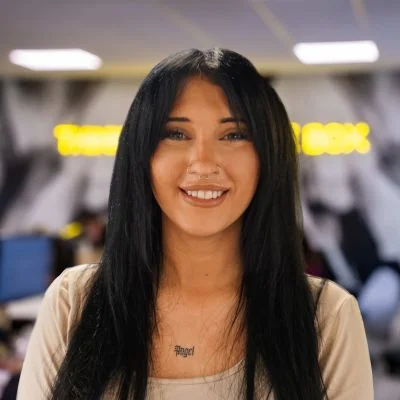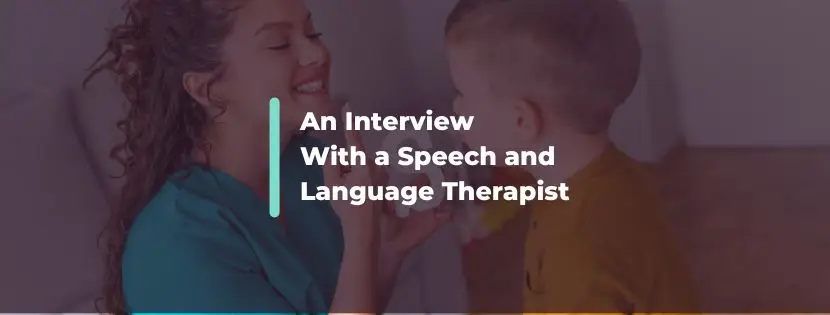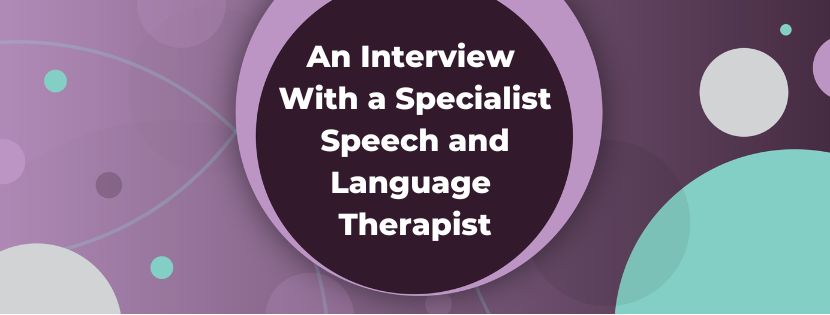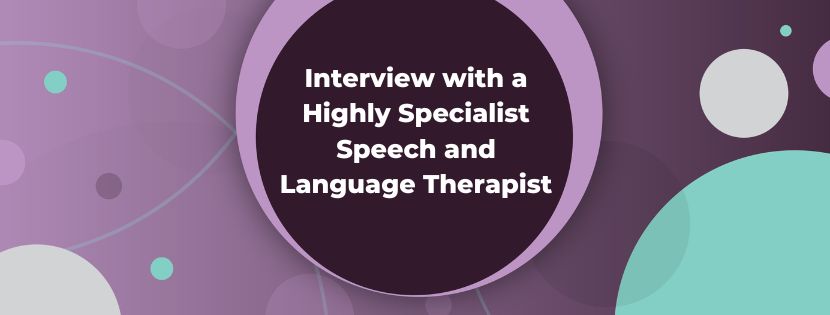Interview With a Highly Specialist Speech and Language Therapist
11 Sept, 20241-2 minutes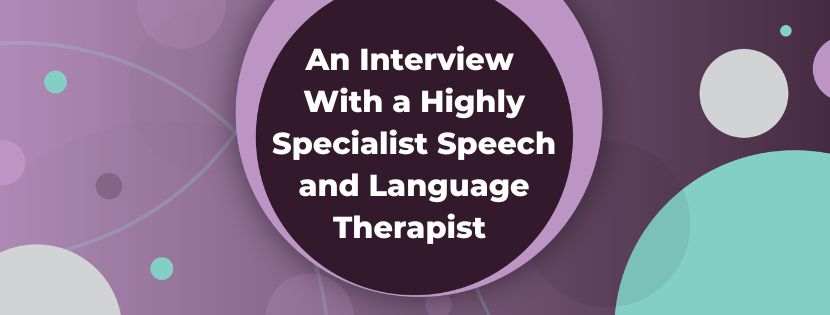
In this blog, you will learn:
- The role of a Highly Specialist Speech and Language Therapist.
- How to stay up to date with the latest research in the speech and language therapy field.
- How to overcome the challenges Speech and Language Therapists face.
- Where the latest Speech and Language Therapist jobs are and how to apply for them.
Interested to know more about the role of a Highly Specialist Speech and Language Therapist? Speech and Language Therapists play a crucial role in patient care and provide life changing treatment and support. They work with individuals of all ages who struggle with swallowing and communication.
According to Shropshire Start, 76,000 children in England are waiting for speech and language therapy and 17% of speech and language therapy posts in England are vacant, the Royal College of Speech and Language Therapists (RCSLT) has said.
The industry is trying to encourage more individuals to take up this career path to help with the backlog and get children the support they need.
We had the opportunity to speak to a Highly Specialist Speech and Language Therapist, Kayleigh Sparkes, to discover more about this rewarding career path.
From what a typical day looks like to the changes she would like to see in the industry, Kayleigh uncovers everything aspiring Speech and Language Therapists may want to know about the role.
Tell us about your career so far.
I graduated from Marjon University in 2009 and began my career as a Speech and Language Therapist within a specialist school setting. Since then, I’ve taken on several different roles working with young people within a special school setting.
I then became a Highly Specialist Speech and Language Therapist, leading the speech and language therapy team and being head of the school sixth form.
As part of my development, I achieved my Assessment Practising Certificate (APC) for accessing dyslexia and have a keen interest in all forms of Augmentative and Alternative Communication (AAC) as well as ensuring that therapy intervention is neuro affirming. I’m a trained ELKLAN tutor and have enjoyed providing training to other professionals, including to graduate training Teachers.
I’m a RCSLT research champion and have had posters presented at both research champion conferences and at the RCSLT conference, showcasing small case study research taking place within a special school setting.
Most recently, I sat on the manager's panel for the RCSLT student conference which enabled me to speak to the latest cohort of Speech and Language Therapists that were about to graduate. I’m currently taking care of my young children whilst considering what my next move within speech and language therapy will be.
Can you give us an overview of your role as a Highly Specialist Speech and Language Therapist?
I provide assessment and therapy intervention on both an individual and group basis to young people with speech, language and communication needs. I supervise other therapists and assistants within the service either through clinical supervision or for specific projects that may be underway within the department.
I lead on projects that improve the speech therapy being offered linked to specific areas such as being a communication friendly setting or new ways to collect and use data. These also include joint projects with other professionals such as Occupational Therapists or Teachers.
I also oversee the collection of various types of data linked to outcomes and analyse it, producing recommendations for the team to help the continuation of improved outcomes for young people.
Can you describe a typical day in your role?
The fantastic thing about a career in speech and language therapy is that no two days are ever the same.
The roles I’ve had have always involved direct assessment and therapy intervention with young people, however, one day I may be providing language therapy to an individual followed by a class-based therapy session and the next day, I may be producing low tech AAC resources followed by training staff or parents. The job is always fun, refreshing and exciting.
I also work with young people to support them in finding ways to overcome their difficulties either through therapy intervention or by giving them the self advocacy skills to speak up and educate others.
How does your role differ from a general Speech and Language Therapist?
The levels of responsibility increase. I may be expected to lead on projects, be a specialist of a particular area of speech therapy and supervise more junior members of the team.
Becoming a Highly Specialist Speech and Language Therapist also involves being highly specialist in an area of the profession. This includes being up to date with new developments in my field as well as leading and guiding others.
What are the key challenges you face in your role, and how do you overcome them?
Time. When becoming a Highly Specialist Speech and Language Therapist, your responsibilities increase. However, I’ve found that caseloads stayed the same, so the demands on your time continued to increase. There’s a need to work effectively and efficiently whilst being confident in how to prioritise need.
Remaining current is also a key challenge. The world of speech and language therapy is ever evolving and these changes happen on a day-by-day basis. It can be challenging to ensure you are continuing to practise with the most current information and resources.
It’s vital that Continuing Professional Development (CPD) time is regular to ensure you are the best therapist you can be.
How do you stay updated with the latest research and practices in your field?
Sites such as LinkedIn are great for accessing the latest articles and research development from around the world. Often people will summarise what they are sharing to enable you quick access to the information before committing to reading it in full.
Using websites which summarise articles and allow you to listen to them whilst on the go have been really useful. I also listen to podcasts as you can listen to these anywhere rather than being restricted to needing to sit down and read.
I find it far easier to keep up with current research and information when it's linked to a passion of yours as you're more likely to make time for this and prioritise learning.
What changes would you like to see in the speech and language therapy industry and why?
Further development of apprenticeships and alternative ways of accessing training as I believe these are vital in enabling more people to train as therapists. Ongoing mental health and wellbeing support which is active in reducing the likelihood of burnout within the profession.
What do you love most about working in speech and language therapy?
Personally, my favourite part of working within speech and language therapy has always been providing direct individuals and group therapy. I love working with young people to develop their language skills and watch them achieve their personal goals both within the classroom and in the wider community.
I also love being able to mentor more junior members within a team and see them progress into successful, confident therapists.
Speech & Language Therapist jobs
If you’re searching for your next Speech & Language Therapist job, why not take a look at the latest vacancies, or simply upload your CV to be notified when a relevant position becomes available.
Recruit Speech & Language Therapists
As healthcare recruitment specialists, we support local authorities and private sector businesses nationwide with their temporary, interim and permanent recruitment needs.
If you’re struggling to fill a Speech & Language Therapist vacancy, why not get in touch with our healthcare specialist, Natalie Boaler on 01772 954200 to see how we can help?
Share your experience
Every individual brings a unique set of experiences, thoughts, and insights to the table. We believe in giving a voice to a community of professionals to inspire positive change and champion reform in the healthcare sector.
If you work in the healthcare sector and would like to share your own personal and professional experiences, we’d love to hear from you. Perhaps you have a different perspective, could offer a fresh angle, or want to challenge assumptions.
Simply reach out to our Head of Content, Nicole Sherwood, to discuss a collaboration which makes your voice count.
Who is Spencer Clarke Group?
Established in 2017, we’re a vibrant and progressive recruitment agency based in the heart of the North West.
We continually reimagine the recruitment process to challenge convention and defy expectations; from creating a better recruitment experience to remodelling employee engagement, we thrive off doing things differently and turning heads along the way.
We operate in two sectors:
In eleven specialisms:
Healthcare, Social Care & Nursing
Corporate Functions & Business Support
